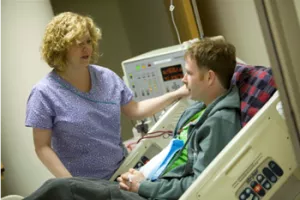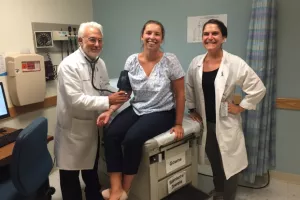Inpatient and outpatient nephrology fellowship experience at Tufts Medical Center
The Nephrology Fellowship at Tufts Medical Center offers a comprehensive mix of inpatient and outpatient clinical training. Fellows gain hands-on experience managing complex kidney conditions in both hospital and ambulatory settings, preparing them for a wide range of careers in nephrology.
Fellows rotate through two core inpatient services:
- Kidney consult service: Two fellows manage a broad range of inpatient consults across Tufts Medical Center, including acute kidney injury, fluid and electrolyte disorders and complex multi-specialty cases.
- Transplant service: One fellow focuses on inpatient care for kidney transplant recipients, including donor and recipient evaluation, perioperative management and post-transplant care.
Outpatient training is equally robust:
- Fellows participate in continuity clinics that span all stages of chronic kidney disease.
- They care for patients receiving outpatient hemodialysis, home hemodialysis and peritoneal dialysis.
- Additional exposure includes subspecialty clinics in glomerular diseases, hypertension, kidney stones and rare kidney disorders.
Second-year clinical track fellows also complete several focused study blocks, tailoring their training toward a specific area of interest. These experiences include mentorship, research or quality improvement projects, and rotations developed around topics such as:
- Cardio-renal syndrome
- Glomerular diseases
- Hypertension
- Kidney imaging and procedural nephrology
- Kidney replacement therapy
- Medical education
- Onco-nephrology
This balanced, hands-on experience prepares our fellows to excel in all aspects of nephrology practice.

